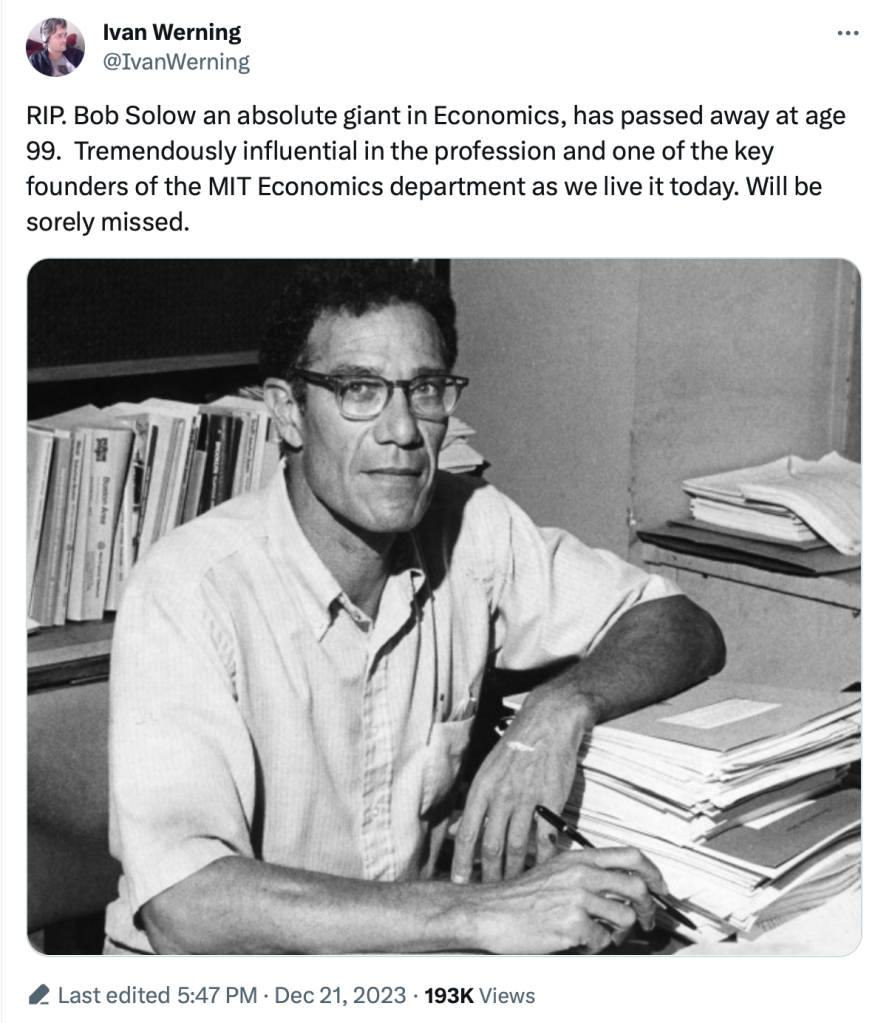2023 continues to be a dangerous year for eminent economists. We have once again lost a Nobel laureate who was influential even by the standard of Nobelists, Robert Solow:

I’m sure you will soon see many tributes that discuss his namesake Solow Model (MR already has one), or discuss him as a person. I never got to meet him (just saw him give a talk) and the Solow Model is well known, so I thought I’d take this occasion to discuss one of his lesser-known papers- “Sustainability: An Economists Perspective“. What follows comes from my 2009 reaction to his paper:
For Solow, sustainability survives as a “necessarily vague, but useful” idea. He notes that sustainability has been conflated with other moral ideas about environmental protection, but that sustainability itself does not necessarily mean preserving species or wilderness. Instead it is about “distributional equity” between the present and the future. This means that we should be comparing general standards of living- how much are we better off because we make future generations worse off- rather than only the status of the environment.
To Solow, this means that future generations will value our investments as well as our preservation of resources, so they would not necessarily want us to preserve resources at the expense of investment; but he does say that both investment and resource preservation should be preferable to consumption.
His best idea is to clarify all this by looking at the sustainability of past generations. We are talking about doing well by future generations, but to past people we are one of those future generations! Are we happy with how sustainable our predecessors’ economy was?
Well, they killed off the dodos and mammoths, used up most of the oil in the continental US, and left a lot of toxic chemicals lying around; so in the purely environmental sense, they did not do very well. But in a broader sense, they did fine by us; in fact, I think we got the much better end of the deal. We have a vastly higher standard of living than people did 50 or 100 or 10000 years ago; inter-temporal distributional equity would actually entail more past environmental degradation insofar as it allowed our very poor ancestors a higher standard of living.
This same logic implies that we should worry less about developing countries like China raising their living standards though industrial pollution, since future Chinese people (as well as current and future moralizing Westerners) will have better living standards even after resource degradation and pollution has been accounted for.
Certainly, I am happy that past generations built Philadelphia rather than leaving forests, built Paris rather than leaving plains, built Boston rather than leaving us swamps to enjoy. I would like to have mammoths around to look at in zoos (or hunt?!!), but I am sure that prehistoric hunter-gatherers got a lot more enjoyment from not starving than I would from having a better zoo.
Perhaps there is some inherent moral value to not polluting, or to preserving wilderness, or (most plausibly) to not causing species to go extinct. But this is a different thing than sustainability for the sake of future generations of humans; it is instead about valuing other species, or the environment generally, inherently and for their own sake. Which is another discussion entirely!
Rise in living standards is good but you are not including the using up of finite resources to keep up those standards. Loss of nonrewable oil and minerals, sure, but also “reservoirs” like oceanic/atmospheric CO2 capacity, forest health and ecological diversity in general, etc.
(Not to take away humanity’s achievements…. Obviously, we have always innovated our way out of Malthusan apocalypses. But I feel that “sustainable as long as we keep making scientific breakthroughs” is stretching the meaning of the word “sustainable”).
It’s like saying we’ve “sustained” the economy in the last X years without taking into account the fact that we’ve increased debt to maintain it. How much is that debt worth to future generations? Depends on many factors, but it’s not zero.
LikeLike